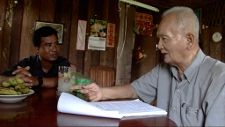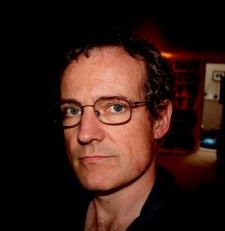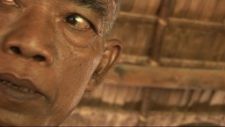
Thet Sambath interviews Nuon Chea
Hear the term ‘Holocaust’ and the concentration camps of Germany during the years of the Second World War immediately spring to mind. And yet, the term can be ascribed to many horrors throughout history. We simply aren’t as aware of them as we should be.
One such shameful period is the oppressive regime of the Khmer Rouge in Cambodia during the 1970s. More than 20 per cent of the population lost their lives to a violent reorganisation of the social structure, many of them buried under the very earth they had ploughed, sowed and cropped in the hope that it would sustain generations.
The reasons why an entire people were reduced to little more than a problem requiring a solution, have, up till now, remained unexplained. Thanks to the crusading spirit of Khmer journalist Thet Sambath and the keen eye of documentarian Rob Lemkin, much of the truth behind such tragedy is now revealed in the moving film Enemies Of The People - which sees the pair talk to some of the perpetrators of the Killing Fields. We spoke exclusively to Rob about the film. His answers offer further illumination to genuinely staggering events.
Could you give us a brief overview of the film and also how you both came to collaborate on the project?
The film is one man’s journey to the heart of the Killing Fields. I had planned to make a film about the trials. I went to Cambodia in 2006 and started work with Sambath as a fixer and found Nuon Chea [Pol Pot's second-in-command, better known as Brother Number Two] would tell me nothing, but I realised there was something in the relationship between Sambath and Nuon Chea (and Sambath and the killers) that may be a way of getting at something deep and interesting. So we decided to go 50-50 as a true joint venture.
What do you hope to achieve with the release of this film in Europe or the US?
To demystify the violence of the Khmer Rouge. They understandably have been portrayed in extreme and sensational terms. We want to get to an unadorned, human reality, in order that there can be greater understanding about the nature and origins of political mass violence and about how we should respond to the people involved.

What has the reception been like in Cambodia as it coincides with the trials of Khmer Rouge officials like Nuon Chea and Kaing Guek Eav taking place at the Extraordinary Chambers in the Courts of Cambodia (ECCC)? How do you think the film will be received outside of Cambodia?
The film has not yet been shown there. From Sundance [where the film premiered], Cambodian media reported every day on TV and radio and the country was electrified by the news of the film. The film is currently going through official clearance, because of its sensitivity it is being watched by the government cabinet before approval.
Outside Cambodia, the film is electrifying audiences at festivals so far – US, Mexico, Hong Kong, Europe. Ten awards in all. (last weekend, Full Frame Grand Jury). This week we're going to Serbia (volcano permitting) where there is immense interest in film (throughout the Balkans actually, perhaps for obvious reasons)
You talk about reconciliation and renewal in the film, was it intentional to connect that to the renewal seen in nature, such as the trips to the Killing Fields and the visits to the rural areas where the former Khmer Rouge have their homes.
We wanted make the landscape part of the human and emotional story – in literature it has been called the ‘pathetic fallacy’. Because the violence largely happened in the countryside, done by country people to other country people for a political revolution that prized the country over the city. Nowadays, victims and perpetrators are still living in the same countryside, it’s still charged with memory and haunting but the violence has passed. Because the film is really about the present (and the future) in a way even more than the past, the continuity of the physical landscape is crucial to cinematically dramatising this theme.
What about the contrast between Thet’s more composed, almost conversational style of interviewing with the possibly more aggressive, darker, editing, sound and camerawork? What kind of effect are you trying to produce?
We wanted the film to be a kind of ‘road movie in time’, so Sambath’s current day-to-day research is given an epic and dramatic charge by situating it in the larger flow of a tragic history – so we use brooding music and archive to contrast with lightness and humdrum-ness of the ‘road movie’.
The main theme of the film seems to be that it is not for the old to seek revenge in the present, but for the young to learn about the crimes of the past. How does that fit with the more aggressive policies we see around the world today?
Sambath and I share a view that the only way to understand conflict and violence is to approach the perpetrators in a non-judgemental respectful way. From this, a body of true knowledge can come and provide genuine hope that mistakes of the past may not be repeated. Usually when people say ‘never again’, the past crimes are blamed on ‘evil monsters’ and the exposure of such individuals is supposed to prevent a repeat. I would say we need to grasp the humanity in inhumanity if we are to really understand mass violence and terror.
Sambath says in the film: the big mistake was Pol Pot and Nuon Chea’s decision to kill. That is the key. The killing fields are but an extreme manifestation of what happens when politicians decide to solve political problems by killing people.

The most surprising thing about the film is the bond that is formed between Thet and Nuon Chea. How did it feel to build this relationship when not only was he the man responsible for the deaths of your family, but also the reason you were away from your wife and children for so long?
Sambath forms genuine close, lasting relationships with Khmer Rouge people when they tell him the truth. The more truth they tell, the more respect he has for them. In that, I think there is a strange but rather healthy sort of non-violent revenge (bearing in mind his childhood world was destroyed by these people).
I also think Sambath, as an orphan in a civil war (post-Khmer Rouge), learned early on to compartmentalise his life and that has continued.
Do you think people will be surprised that the film isn’t angrier? That it isn’t more of a polemic considering the subject material and how close you got to the people responsible for such atrocities, especially when you consider you had a personal stake?
People come to the film expecting it to be an angry descent into hell. Most are surprised by the very different take. Although it takes us far closer to hell than most films about atrocities, it does, at the end, come up to see the light. And that is why I think audiences have been responding so positively to it. They themselves go through the experience of alternating sympathy and horror for the killers. We wanted it to be a lived experience for the audience and one that is edifying and galvanising rather than paralysing and depressing.
Can you give us any details of your future projects? Any plans to collaborate again?
We are planning a second film – about the inside story of the political conflict at the heart of the Khmer Rouge – in other words, the real reason why so many people were killed. This will be less personal and more like a political conspiracy thriller – it will hopefully answer the key questions audiences often have on the factual level after watching Enemies of the People I.
I also have a short documentary film in preparation about soldiers blinded in war and a political drama.
Sambath and I are hoping our film can be the beginning of a genuine process of truth and reconciliation in Cambodia – with application for other societies too – and we hope to set up an organisation that will continue the work and use the methodology to encourage communities to come together to face the future together. We are also planning a book. And being inveterate investigators, we are also continuing to unearth more information about the Khmer Rouge regime as we go along.





















